Introduction to International Relations
Theory and Practice
JOYCE P. KAUFMAN
ROWMAN & LITTLEFIELD PUBLISHERS, INC.
Lanham Boulder New York Toronto Plymouth, UK
Published by Rowman & Littlefield Publishers, Inc.
A wholly owned subsidiary of The Rowman & Littlefield Publishing Group, Inc.
4501 Forbes Boulevard, Suite 200, Lanham, Maryland 20706
www.rowman.com
10 Thornbury Road, Plymouth PL6 7PP, United Kingdom
Copyright 2013 by Rowman & Littlefield Publishers, Inc.
All rights reserved. No part of this book may be reproduced in any form or by any electronic or mechanical means, including information storage and retrieval systems, without written permission from the publisher, except by a reviewer who may quote passages in a review.
British Library Cataloguing in Publication Information Available
Library of Congress Cataloging-in-Publication Data
Kaufman, Joyce P.
Introduction to international relations : theory and practice / Joyce P. Kaufman.
pages cm
Includes bibliographical references and index.
ISBN 978-1-4422-2118-5 (cloth : alk. paper)
ISBN 978-1-4422-2119-2 (pbk. : alk. paper)
ISBN 978-1-4422-2120-8 (electronic)
1. International relationsPhilosophy. I. Title.
JZ1305.K378 2013
327dc23 2013003201
 The paper used in this publication meets the minimum requirements of American National Standard for Information SciencesPermanence of Paper for Printed Library Materials, ANSI/NISO Z39.48-1992.
The paper used in this publication meets the minimum requirements of American National Standard for Information SciencesPermanence of Paper for Printed Library Materials, ANSI/NISO Z39.48-1992.
Printed in the United States of America
Contents
Introduction: International Relations in a Globalized World
On September 11, 2001, why did nineteen men affiliated with the terrorist group al-Qaeda hijack four planes and attack the twin towers of the World Trade Center in New York and the Pentagon outside Washington, D.C., and attempt to crash the fourth one perhaps into the White House or the Capitol? Who were these men, and what were their motives? What did they hope to gain from this attack, and did they achieve their ends?
Almost ten years later, in May 2011, U.S. Navy special forces (SEALs) attacked a compound in Abbottabad, Pakistan, killing Osama bin Laden. Abbottabad is home to a large Pakistani military base and a military academy of the Pakistani army. Pakistan, a supposed ally of the United States in the fight against al-Qaeda, was not informed of the raid in advance. Furthermore, following the raid, serious questions emerged about what the Pakistani military didor did notknow about who lived in that compound. If Pakistan was aware of bin Ladens whereabouts in the country, shouldnt they have notified the United States, an ally? How could bin Laden, a wanted criminal, have lived within a mile of Pakistani military forces for so long undetected? Should the United States have notified its alleged ally prior to the raid? And did President Obama make the correct decision in authorizing the raid and then bin Ladens burial at sea immediately after? Who else was involved in these decisions?
Here is another set of questions to ponder that might strike a little closer to home. How does Wal-Mart, one of the largest corporations in the world, influence policy not only in the United States but in the countries in which it has factories? What is the trade-off between allowing you, the consumer, to purchase goods at a relatively low price if that possibly comes at the cost of exploiting the laborers who produce those goods? Or looking at this another way, is the labor really exploited when working for Wal-Mart in a factory in Bangladesh is the difference between a worker being able to put food on the table or starving? How can a company, which exists outside the bounds of government, have so much power?
These are all examples of questions that we ponder and study in the field of international relations.
WHY INTERNATIONAL RELATIONS IS IMPORTANT
International relations (IR) as a field of study deals with decisions that are made within a country that have implications for relationships outside the borders of that country. But it also asks a number of other important questions: Who makes those decisions? Why? How are they made? Who is affected by them? And what are the likely responses to those decisions? But what makes the study of international relations especially complex is the range of actors who could be involved with answering any and all aspects of those questions.
One of the really important questions to ask is: What does IR have to do with me personally? These seem like really big questions that are removed from most of us. But the reality is that they are not. Every time a country decides to go to war, it has implications for what happens not only to the people in that country but in other countries as well. For example, when President George W. Bush authorized the invasion of Afghanistan in October 2001 in retaliation for the September 11 attacks, he committed U.S. forces to fight. That meant ensuring that there were enough U.S. military forces available to fight that war. But it also meant supplying the military for that invasion, which resulted in more money being required for the Defense Department. Tax money spent for the military cannot be spent for other things, such as education; this is known as guns versus butter. So directly or indirectly, that decision affected you.
Other countries are also affected by terrorist attacks and therefore have a vested interest in confronting al-Qaeda. So it became necessary to round up allies to work with the United States in Afghanistan so that the United States did not have to bear that burden alone. That is the role of alliances, specifically bringing in other countries to work together in pursuit of common goals. So other countries, and the people within them, were affected by the decision made by President Bush. And clearly, so were the people of Afghanistan.
Lets look at another case. The economic instability in Europe in 2011 and 2012 and the decision of the euro zone to bail out Greece and Spain might seem irrelevant to you. But in a world in which countries are interdependent, economic instability in Europe can affect the U.S. economic system. Entities in the United States own European debt just as China owns U.S. debt. The possibility that there could be a default on that debt in Europe could panic the people in the United States who own the debt, which in turn could lead to more economic uncertainty in this country. Similarly, there are some in the United States who are concerned about how much U.S. debt China owns. Does that mean that China owns parts of the United States? These questions are all a function of an interdependent globalized world that, in some ways, brings countries closer together. But it also illustrates the dangers of that close relationship, where uncertainty in one country or region (in the case of the euro zone) can have a marked impact on another.
The bottom line is that these are very difficult issues that generate complex questions, and if we are ever going to attempt to answer them, we need to find a way to simplify the reality so that we can focus on one aspect of the problem at a time. For example, in the case of September 11, if we want to know more about the hijackers, we can focus on the men who acted together as part of a terrorist group that sought to inflict damage on the United States. Or put into IR terms, we are looking at the impact that a nonstate actor (al-Qaeda) had on a major international actor (the United States) in order to influence U.S. policy in some way.
Or we can look at it another way that also would provide some explanation for the actions of 9/11. In this case we can start by identifying the nineteen men as individual actors who were part of a larger group and agreed to engage in a suicide mission. If we were to take that approach, our focus would be on the men as the actors and on what motivated them to act as they did. This would be a smaller or more microlevel response.


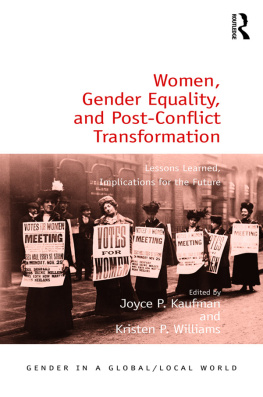
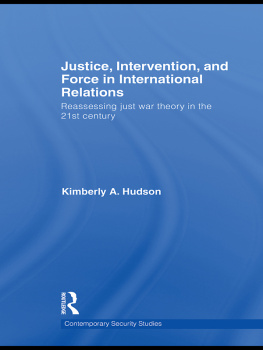
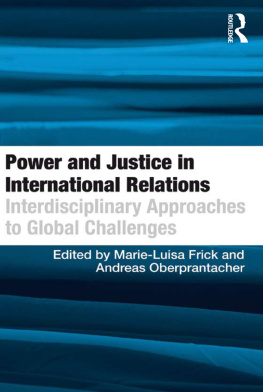
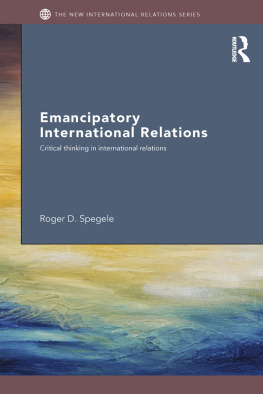
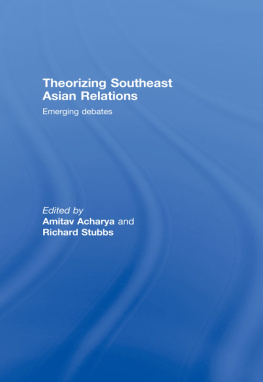
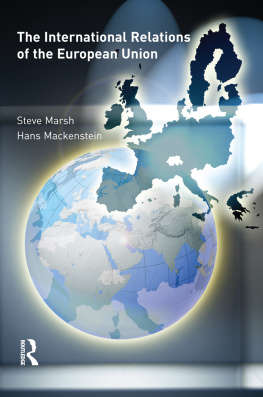
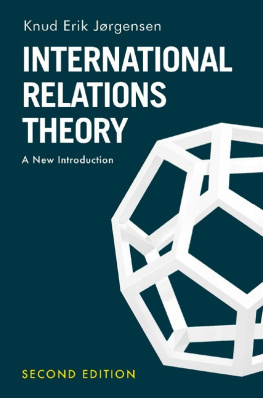
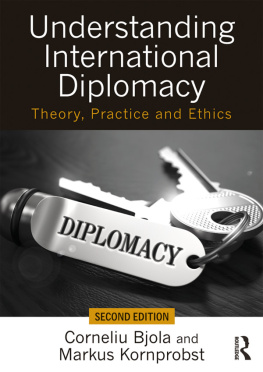
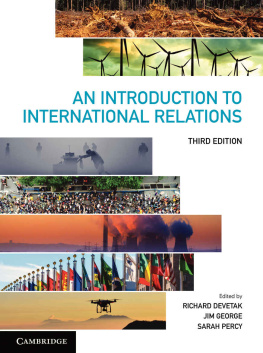
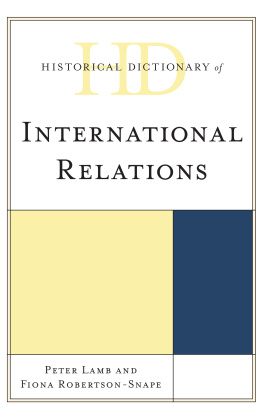
 The paper used in this publication meets the minimum requirements of American National Standard for Information SciencesPermanence of Paper for Printed Library Materials, ANSI/NISO Z39.48-1992.
The paper used in this publication meets the minimum requirements of American National Standard for Information SciencesPermanence of Paper for Printed Library Materials, ANSI/NISO Z39.48-1992.